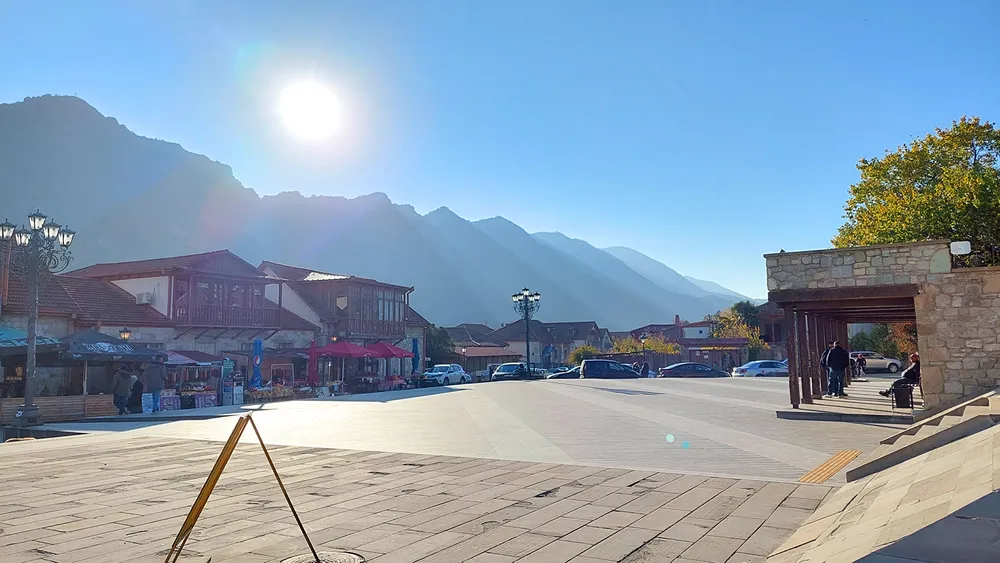Mtskheta

Expats Land
Mtskheta is an ancient city in Georgia, situated at the confluence of the Kura and Aragvi rivers, just 20 kilometers from the capital, Tbilisi.
It was one of the most significant cities in the history of Georgia, and today it remains a cultural and religious center of the country. Mtskheta is one of the oldest cities in Georgia, with a history spanning over 3000 years.
Throughout various periods in its history, Mtskheta came under the rule of different states. Today, Mtskheta is one of Georgia's cultural and tourist centers, with its historical landmarks included in the UNESCO World Heritage List.

The Legend of Mtskheta's Foundation
Targamos (the great-grandson of Noah) divided the land among his tribes, distributing it according to their merits. His second son, Kartlos, arrived at the place where the Aragvi and Kura rivers merge. He ascended a mountain named Armazi, fortified it, built a house for himself, and named the mountain Kartli after himself. Before the erection of an idol of Armazi on its summit, the mountain was known as Kartli. Consequently, the entire land, stretching from Khunani to the Speri Sea, was named Kartli.
Among Kartlos's sons, five heroes stood out: Mtskhotos, Gardabos, Khakhos, Kukhos, and Gachios. All five were mighty warriors, but Mtskhotos, as a hero, surpassed his brothers.
After Kartlos's death, he was buried on the summit of Kartli, now known as Armazi. Kartlos's wife divided the land among their five sons.
Mtskhotos, the mightiest of the brothers, remained to live in his father Kartlos's land, which is now called Armazi. He built a city at the confluence of the Kura and Aragvi rivers and named the city after himself – Mtskheta. From there, he extended his dominion from Tbilisi and the Aragvi to the Speri Sea in the west.
However, when Mtskhotos, Kartlos's son, died, a feud arose among Kartlos's sons. They started internal conflicts and mutual invasions. Only the one who sat in Mtskheta was considered the leader of all the chieftains. They were not called kings or eristavis but were referred to as mamasakhles. The mamasakhli sitting in Mtskheta was the reconciler of the warring parties and the judge over all the Kartlosids, as the city of Mtskheta towered above all other cities (Kartlis) and was called Deda-Kalaki (Georgian: mother-city, i.e., capital).
Historical Significance of Mtskheta
Mtskheta is associated with numerous historical events and pivotal moments in Georgia's development. The city was founded in the 1st millennium BCE and served as the capital of Georgian states during various periods. Mtskheta played a crucial role in the political, religious, and cultural life of the country, and its historical monuments bear witness to a rich past.
Monasteries and Temples
Mtskheta is also known for its monasteries and temples, which hold historical and cultural significance. The magnificent Jvari Monastery, situated on a hill overlooking Mtskheta, was built in the 6th century and is a popular destination for tourists and pilgrims. Another significant temple, Shio-Mgvime, attracts visitors with its architecture and religious importance.
Pilgrimage and Tourism
Mtskheta appeals to both pilgrims and tourists who wish to immerse themselves in the rich history and spirituality of the region. The city is a popular tourist destination where visitors can enjoy stunning views, stroll through the medieval streets, and learn more about Georgian culture and traditions.
Conclusion
Mtskheta is an ancient city with a rich history that plays a vital role in Georgia's cultural and religious heritage. Its historical landmarks, spiritual sites, and unique architecture attract tourists and pilgrims from around the world. Visiting Mtskheta allows you to delve into the deep significance of this place and experience its unique atmosphere.
Destinations on the map
Our services
Guide
All the necessary information for moving to Georgia and living in it